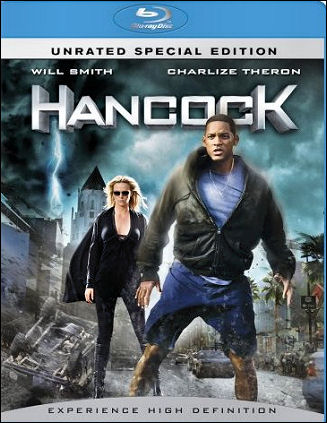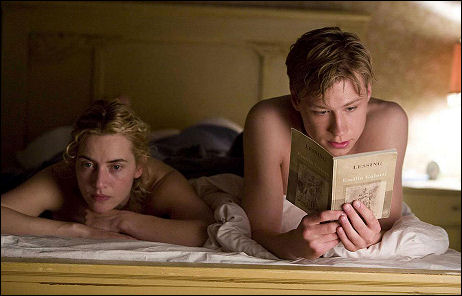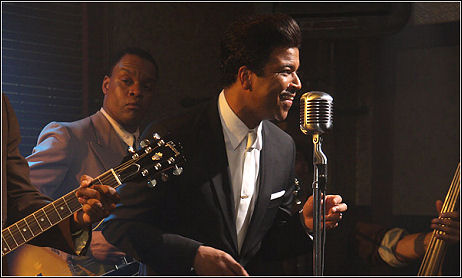N.Y. Daily News gossip columnists George Rush & Joanna Molloy have been — how else can I put it? — elbowed aside by Ben Widdecombe‘s Gatecrasher column, which will now run daily with R & M’s column to run once per week on Sundays. Sounds like a cost-cutting move. George and Joanna are way too young (and too expert at what they do) to be put out to pasture.
Day: December 5, 2008
Knight Surge?
An older Academy friend has just spitballed what he believes the five Best Picture nominees will be at the end of the day. The top four will be Slumdog Millionaire, Milk, The Curious Case of Benjamin Button and Frost/Nixon — all routine picks. The surprise is that he believes the fifth slot will be filled by The Dark Knight. Really? Sure, he said — the Academy is getting younger and younger, and all along the word on that film has been strong and steady.
Monochrome Options
I’m so queer for monochrome that I’d be delighted if one-fifth of all feature releases, say, were shot in this mode. Because black-and-white pretty much trumpets the fact that you’re sitting at home (or in a theatre) and watching a “movie.” There are some films in particular, however, that I’d really love to see in those sharp, silvery, glistening tones. Revolutionary Road, I feel, would be heaven in monochrome. Ditto the World War II-era Valkyrie. I can’t be the only one who thinks this way. Which films would others like to see, or would have loved to see, in black and white? Risky Business would never work in monochrome; ditto Body Heat, Raiders of the Lost Ark, Weekend at Bernie’s, Jaws and ten thousand other films.
No Sale
No — don’t buy Hancock on Blu-ray unless you have the movie-watching taste buds of a mountain gorilla. It has one of the dumbest, looniest third acts ever created in the history of drama. Relentless big-whomp special effects, but what’s that?

Basic Morality
I’m finally ready to comment on a moderately controversial 12.2 Huffington Post piece by film critic Thelma Adams about how the older woman-teenage boy relationship in Stephen Daldry ‘s The Reader is basically a case of child abuse, and if the sexes were reversed (older guy, teenage girl) it would definitely constitute child abuse.

Kate Winslet, David Kross in The Reader
I’ve explained this a couple of times since the dawn of Hollywood Elsewhere in August ’04, and I’ll probably have to keep explaining it. If an older man takes a 15 year-old girl to bed, he’s an animal and a scumbag who deserves to go to jail. But if you’re a 15 year-old teenage boy (or 14 or 16 or whatever), you automatically get down on your knees and give thanks to God if an older woman wants to go to bed with you. No ifs, ands or buts — it’s a gleaming gift from heaven.
If a woman in her 20s or 30s or even her 40s had been interested in yours truly when I was 15 or so, I would have turned out a much happier person — certainly a more optimistic one. There’s no way in the world I would have ever been screwed up or even moderately traumatized by such a blessed, rhapsodic event.
Different standards but that’s how it is.
Contrarian
“I just saw Milk and as I’m watching it I’m thinking this is really, really dull. This is such a paint-by-numbers biopic that the only stand-out thing is the fact that it’s about gay men. But as an emotionally involving narrative, it’s just flat flat flat. And why is it that an incredible thriller like Transiberian can come out and no one pay attention to it. The state of film criticism is now so tied to the marketplace that it’s slowly choking American film as an art form. Maybe it’s just me.” — received this morning from a filmmaker friend.
Whackings
The beginning of the real bitter end of the Hollywood Reporter happened yesterday when, as Nikki Finke has reported, several essential, first-rate people were cut from the payroll — film reporters Gregg Goldstein, Carolyn Giardina, Leslie Simmons, managing editor Harley Lond, TV critic Barry Garron, TV reporter Kimberly Nordyke, Manhattan-based special issues editor Randee Dawn, international department editor Hy Hollinger, plus Dan Evans, Lesley Goldberg, Michelle Belaski and James Gonzalez.
Plus the roilling heads at Paramount, Universal/Focus and Newsday.
Plus I’m told that film critic Glenn Whipp has been cut from the ranks of the L.A. Daily News. Put vaguely, his duties and/or compensation have been reduced beyond a duties/compensation diminishment that had happened previously. (I could make it vaguer.) Whipp didn’t reply to an e-mail, his colleague Bob Strauss didn’t reply to email and a call, Whipp’s arts editor didn’t pick up, etc. People never seem to want to call back when someone’s been cut. Nobody wants to touch it.
Persistence of Che
An intriguing, above- average interview with Che director Steven Soderbergh by Indiewire‘s Anthony Kaufman.
Head-Scratcher #37
Annoyed by the one-week exposure of Steve McQueen‘s Hunger, Film Experience’s Nathaniel Rogers is claiming that the one-week qualifying runs are “cheating…they’re a loophole. You are not really a 2008 movie if you open at one theater in one city for one week and then remove yourself quickly to plan for 2009. The idea, for all films that try this tactic, is to win Oscar nods and hope that that will boost their profile when they open for real. But this is rather like trying to pay rent by buying yourself a lottery ticket.
“It’s not easy to get Oscar nods — particularly for small art films — and many films that go this route never make good on their ‘opening in February/March’ claims when they find themselves without Oscar nods… which is the case more often than not. Oops. The system as it is stinks; It’s not healthy for these small movies, it screws with the structural calendar idea of awards systems and most importantly, it’s no good for the movie-loving audience who are left out of the conversation altogether.”
Feel It
Washington Post critic Michael O’Sullivan is calling Darnell Martin‘s Cadillac Records “a rousing, fast-paced tale, told with a modicum of verve and packed with colorfully flawed, occasionally heroic and even tragic characters. It also feels disappointingly bloated and too fast-paced by half. Cramming in that history doesn’t leave much room for — oh, I don’t know — story.

Kevin Mambo as Jimmy Rogers, Columbus Short as Little Walter and Jeffrey Wright as Muddy Waters
“History is propelled forward by the filmmaker’s over-reliance on such now-stale staples of musical biopics as the montage of nightclub marquees, ka-ching-ing cash registers, close-ups zooming in on the names of chart-topping singles and newspaper headlines. It’s a breathless approach, leaving little time in this speeding, noisy, overcrowded Cadillac to take in anything other than the milestones that go whizzing past.”
How, then, to explain the unqualified rave given to the film by the always observant N.Y. Times critic A.O. Scott? Because Scott seems to be into soul music big-time — his review suggests it’s been been making his spirit soar for decades — and so he’s decided to emphasize what he feels in his heart rather than nit-pick Cadillac Records to death.
Scott is especially appreciative of Jeffrey Wright‘s portrayal of blues singer and guitarist Muddy Waters. In his various portrayals of famous African-Americans, Wright “directs our attention away from the familiar, public face of the character in question toward a private zone where ambition struggles with anxiety, and where what seems to be at stake is nothing less than the integrity and viability of the self,” Scott observes. “And so, in his Muddy Waters, we see pride, ambition and uncertainty cohabiting with musical genius, sexual appetite and stubborn professionalism.”
Let It Go
Never underestimate the ability of a person possessed by demons to make reasonable people follow his/her lead and go temporarily mad or lose their composure. Especially if the possessed is an entertainment publicist. I’m not saying what you’re about to read happened last year or last month or a few days ago, but it did happen. At a big-deal premiere for a film. A minor mistake metastasized into Deep Ugly when a certain publicist poured kerosene on it and then threw a match. Brilliant.
The trouble started when I was given the wrong theatre ticket by the guy at the will-call table. I said my name clearly, twice, but I failed to put on my glasses so I could see the name on the envelope, which had my last name right but not the first. I should have put on my glasses and checked the name. My bad.
I went inside, said hi to a publicist friend and asked about snapping a big-name actor in the film at the after-party, and then went into the theatre I was directed to. Right away it felt wrong as my assigned seat was taken by someone else, and a young girl handling seating decided that I must be in the wrong theatre. Then another girl handling seating came to the same conclusion. Their vibe was a little accusatory — “you don’t feel right, you belong elsewhere, we’re going to figure this out.” I decided the best thing would be to stand in the back of the theatre and wait for a resolution.
Then a publicist with frosty blonde swept-back hair came in with a security goon and said a mistake had been made and then asked for the ticket back. I gave it to her — no problem. Everything would have been cool if she had said “sorry, we messed up, I think you were given the wrong ticket, let me have it and I’ll get you the right one.” But her vibe was icy, haughty, dismissive (“I don’t know you”). A mating of Evita Peron and Cruella De Ville.
She then asked for the two party tickets I was holding in a white envelope and I refused. “What does the party have to do with where I sit?,” I said. “I was invited by [publicist’s name], I’m here to help out the film,” etc. But I was ready to give them up anyway in the interests of peace and harmony as long as I had assurance. So I said to her, “Will you replace these two tickets?” and she said, “I’ll give you a party ticket.” No, I said — not “a” ticket but two tickets, as I’d arranged for a friend to join me later.
In response to this, this master of finesse and diplomacy shut down the conversation then and there and told the goons to throw me out of the theatre.
Two goons escorted me out to the lobby and told me I’d have to leave the premises. I said I’m not leaving because I was invited. I don’t mind saying that I was, at this point, livid. I was being treated like a crasher, a slumdog. It feels awful to be restrained by two big guys standing on either side of you, like you’re a prisoner on the way to a lock-up. It was the next thing to being handcuffed. I was saying to myself, “How dare they do this? I was invited, I’m here to see the movie and help out,” etc., and I’m being minded by two linebacker-sized apes.
Then the haughty publicist speedily walked by and I lunged over and grabbed her arm to get her attention and said, “Why are you doing this? What is wrong with you?” She turned and walked away.
Then a publicist friend finally came over and said I was cool and I was told to go into another, grubbier theatre, which I did. Then the haughty and dismissive publicist came in with two goons and had them escort me out of the theatre. “Again?” I said, doubly outraged, but this time I went.
On the way out I was told this was happening because I had “pushed” Ms. Haught. A willful fabrication from a professional liar. To push someone is a blatantly aggressive act, but I didn’t do this. I wanted Frosty’s attention so I grabbed her arm because (a) I didn’t know her name, (b) she wasn’t looking in my direction (i.e., was pointedly not allowing for eye contact so as to avoid conversation) so a gesture or a wave or a “hey, lady!” wouldn’t have worked, and (c) she had already demonstrated her refusal to talk to me and had actually directed security to have me thrown out of the theatre because I wouldn’t surrender the party tickets.
I should have lightly touched the fiendish publicist’s arm, at most. But I felt abused and mauled and violated, and I wanted justice.
The next day I wrote the haughty publicist and apologized for the arm-grab. I realize how it felt from her end, I wrote, but I’d been treated much, much more aggressively at her command. I was humiliated in front of others by being held against my will by a pair of big fat apes. On top of her order to have me thrown me out of the theatre because I wouldn’t surrender the party tickets — a party I was invited to by a publicist representing the film! But I should have sucked it in and chilled down. My bad.
